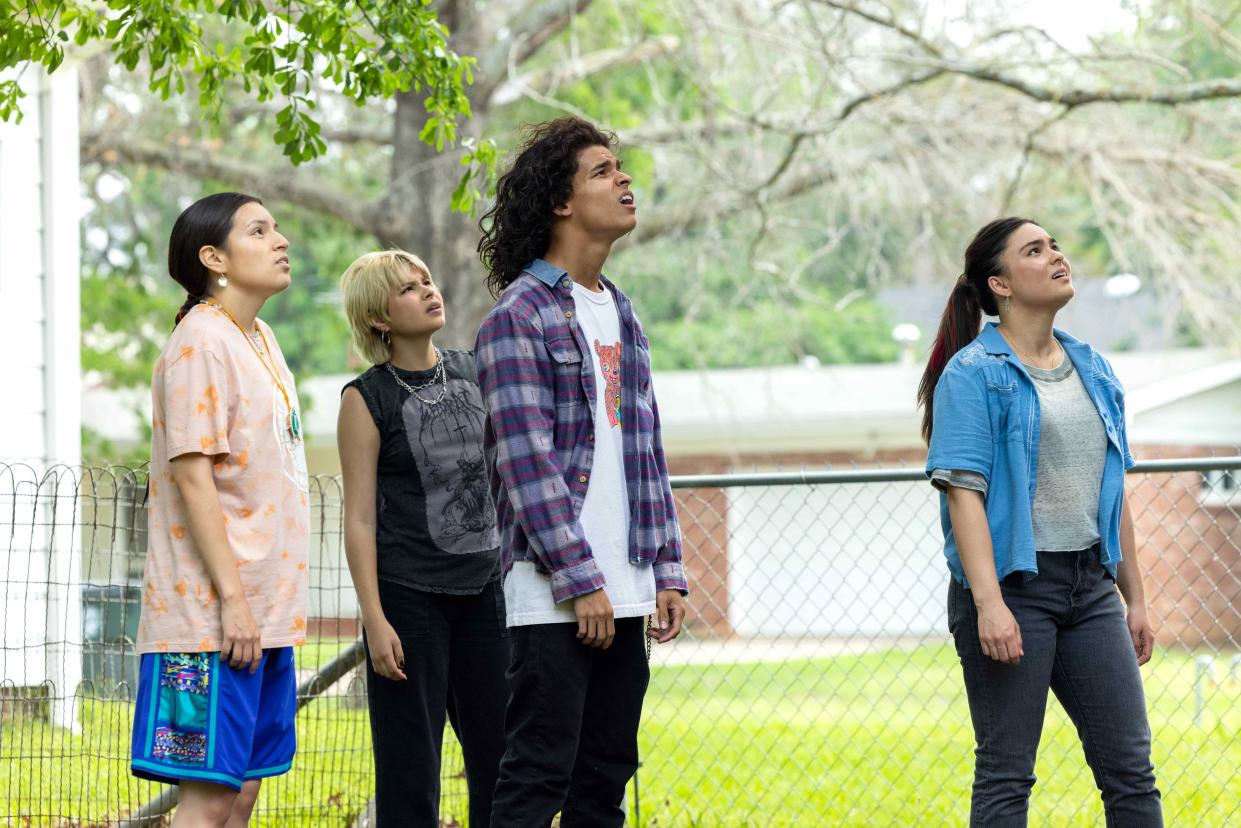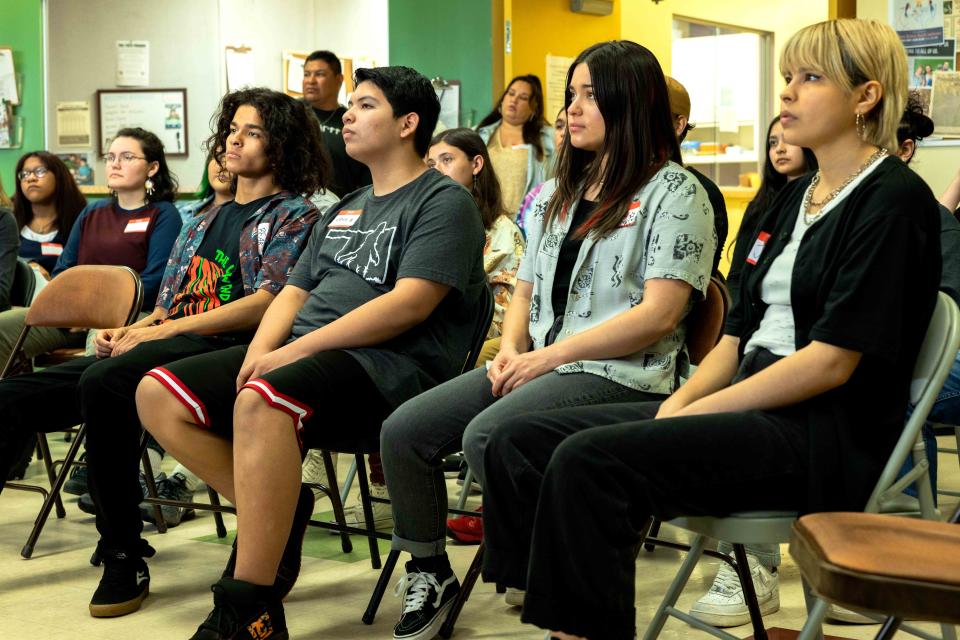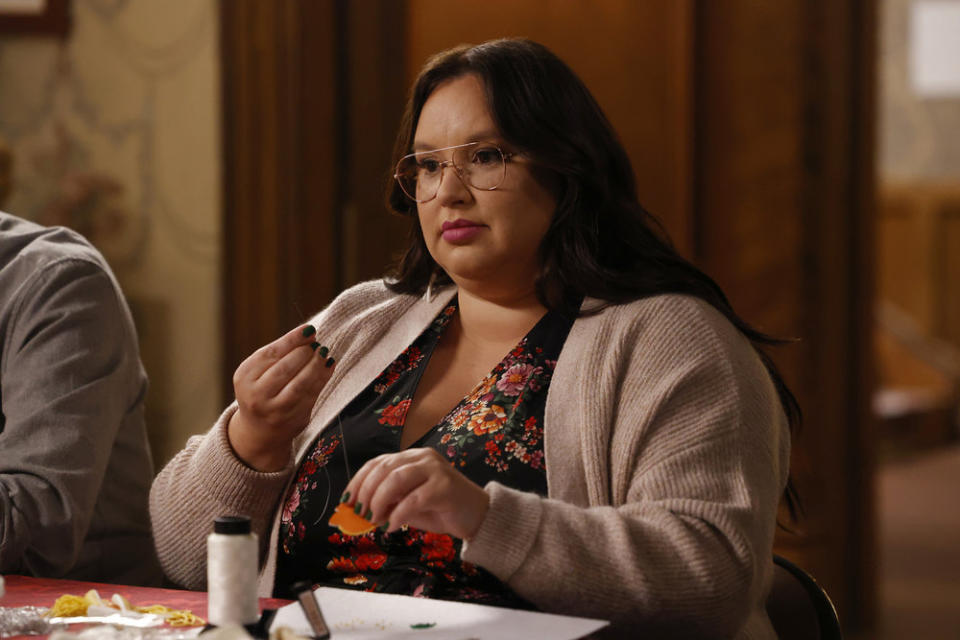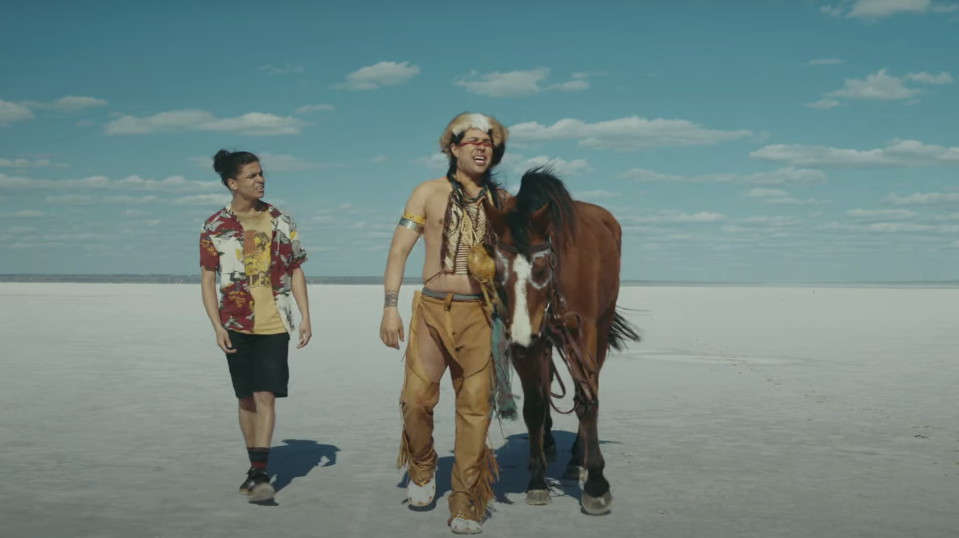‘Reservation Dogs’ Creator Sterlin Harjo on Ending the Show, Emmy Snubs, and the Fight for Native Representation

- Oops!Something went wrong.Please try again later.
- Oops!Something went wrong.Please try again later.
“Reservation Dogs” is nearing the end of its journey, but Sterlin Harjo is just getting started. The showrunner and co-creator of the Hulu/FX hit recently announced that Season 3, which begins this week, will mark the end of a story that has been a gamechanger for Native representation in popular culture. The sweet and poignant show chronicles a group of disillusioned teens in rural Oklahoma overcoming the death of their close friend while navigating the traditions and socioeconomic challenges of their local community.
The show’s deadpan tone blend of Indigenous history and mythology with the universal malaise of American youth culture has turned it into a rare representational win that resonates on a larger scale. While it has been snubbed by the Emmys, “Reservation Dogs” won a Peabody Award and landed on many lists as the best show of the year two years in a row.
More from IndieWire
The third season is likely to follow suit, as it follows the ragtag group of “Rez Dogs” on an eccentric road trip home from Los Angeles and closes the loop on several journeys at once. As he rushed to finish the final episodes, Harjo hopped on the phone with IndieWire to explain his decision to end the show, some of the key storylines of the final season, and what he plans to do next.
INDIEWIRE: Let’s start with the obvious question. This show has been successful for FX and receives great reviews. It’s also a landmark achievement in indigenous storytelling. Why end it now?
STERLIN HARJO: I never wanted it to go further than it needed to. This season felt like it was the end. We find these characters in a very transitional period of their lives. You can’t keep transitioning forever in life. You either learn something or you don’t. You move into a new phase or you don’t. And that’s where we found these characters. So I think they were always meant to go through something and we were going to see them come out on the other side, and that’s where it ends. I’m not a big fan of shows going on forever. It’s not that the well dried up, but I didn’t want it to dry up. So I can’t just keep telling this story forever.
Counterpoint: It’s a pretty sweet gig.
At a certain point, I don’t want to repeat myself and I don’t want to keep playing the same hit over and over either. So it just felt right. It also felt like the show opened the door for a lot of people, and I want to see what they do now.
When did this realization take hold?
I think a year ago, as we finished the second season, I started feeling like the third one could be our last. Then, as we were writing it, I couldn’t get that feeling out of my head. Everything felt like it was moving towards that. Once I finished the finale of this season, it was like, “Oh yeah, this is the one.”
How did FX take it?
I sent them the finale script and kind of figured I’d be getting a phone call. I did get a phone call and I just talked to them about it. I told them that the show’s too important to have somebody else tell me that it’s ending. I wanted to end it on our terms. I don’t want FX or Hollywood or the audience telling us it’s time to pack up because it’s dragging on. I want to go out the way we came in. I’m just really proud of the show. I didn’t ever want someone to tell me it’s time to pack it up. I think it’s better to drop the mic than to get the mic cord cut. You know?
What was the response?

They were shocked. People have asked me if it was their idea. No. I want to respect the nature of the storytelling. This story is coming to an end. I did tell FX, though, there are all of these ideas that I have for spinoffs and stuff happening in the same world. So all that’s up on the table and there’s some ideas that they really like. If someone else told me it was time to end, it would be so offensive to me, because I care about these actors, these writers, these directors, these characters. And I care about the whole crew. If someone told me it was time to pack it in, I would want to battle with them.
What’s your plan for these spinoffs?
I mean, I could follow anybody. I could follow Big. Or what about the Deer Lady? There are so many stories that we could break off. I’ve been doing this since I made my first films. There are names in the show that come from my first short film, “Goodnight Irene.” It takes place at an Indian clinic, and Jon Proudstar, who plays Leon, is there; Casey Camp-Horinek, who plays Irene, is there. In that short, she’s playing Irene, literally the same person, just at a different point in her life. Then my last feature film has Mekko going back to the town of Oakhern. It’s such a unique, specific place. It’s easy to go back into that world.
How soon are you looking to advance these potential spinoffs?
The immediate thing that I’m doing next is not a spinoff, but I think people will see that the “Rez Dogs” world could easily overlap into this world. I think that would be fun to play with. But I am talking about doing some other spinoff stuff.
Speaking of the Deer Lady: The new season has a whole episode where we learn her backstory as a child at a Native boarding school. It’s the first time we’ve seen you deal with this history on the show. What led you to including that here?
When I first wrote her, I didn’t have a sense of what it would her backstory would be, but I knew it would be something older, because at one point I had her talking about being good friends with Big’s grandmother and that they grew up together. That line was cut, but it showed that she obviously didn’t age. So then I realized I had an opportunity to talk about a part in history that doesn’t get talked about, and could humanize the kids that were involved — to show how it would feel to be in such a foreign environment and being told you can’t speak your language. I don’t want to show us as victims. I want to show rage that I think has been put inside of a Native person who knows their history.
When did that history start to have an impact on you?
It had to be a part of stories when I was young. They would tell stories that were passed down on the Trail of Tears, and then there were also stories from boarding school. My grandma went, my mom went, all of my family at a certain age were in boarding schools. My great-grandmother and her husband had a lawyer who really encouraged them not to speak the Muscogee language around their kids because they would not basically survive in this society. So they didn’t. They tried to speak only English to them. I think all of these things are part of the fabric of growing up Native in America, and that’s what I wanted to show with that episode. It’s not like this is ancient history. This just happened. I know these buildings are still standing because we shot in a lot of them. You know what I mean? We didn’t have to do a lot of work to recreate that because that building are still there. It’s very painful to talk about for the survivors. We haven’t had a place in mainstream media at all in TV and film, so there haven’t been many opportunities to tell that story.
You also have a moment in this season where Bear confronts the Spirit who has been following him around the whole show and basically tells him off. Bear has a hard time confronting his own Native history. How central is that to your overall vision for the show?
I think we have gotten this idea that Native history was a bunch of fairytales. It wasn’t. They were real and they live just like us today. You’re trying to watch out for people as you’re moving forward in this world and taking things as they come at you. I think that’s exactly the experience that these kids have on the show. They learn to deal with this loss of their friend Daniel, and they also use ceremony and friendship and their community to grieve and move through it. The show is about how they aren’t detached from that. They just have to recognize that.
When “Reservation Dogs” first came out, there was a sense that Native storytelling was on the verge of a major turning point. But “Rutherford Falls” was canceled by Peacock after two seasons. How much lasting change do you see for Native shows and movies going forward?

Well, I didn’t want to get canceled, that’s for sure. It’s the first time in history that we’ve been on TV like this. For “Rutherford Falls,” it doesn’t say anything about its quality — it says something about Hollywood and the perception of Hollywood and what they think that people want to see. If “Reservation Dogs” wouldn’t have been a success, we would’ve probably had to leave a lot earlier. We were called the best show of last year by a ton of people.
Given all of that, how do you feel about the way Seasons 1 and 2 were both snubbed by the Emmys?
If we would’ve been an all-white cast, we would’ve definitely been nominated for an Emmy after getting called the best show of 2022. I’m not bitter about that. I’m not upset about that. I didn’t expect it. This is very new, so people don’t know what to do with these shows. With “Rez Dogs,” I try to show what types of stories we can tell and how diverse those stories are. That’s the main thing that I want to show is we’re not just one-trick ponies. We can tell sprawling great stories in different genres. Part of my goal with this show and others I can help create is to convince executives that they can be successful. I have made independent films for most of my career that have hardly seen the light of day, and I consider them good films — I think a lot of people do — but they don’t get support. So none of this surprises me. “Reservation Dogs” isn’t lightning in a bottle. It had the support and it had the backing of FX and they let us tell this story and we can keep telling these stories with that support.
This was a streaming-first show on Hulu. Did you ever see specific data about how successful it was on the platform?
No, I didn’t see data, and I don’t know, that feels like a popularity contest a little bit. It’s nice that people in this industry support the show. It just feels good that people like and respect it.
With the strike going on, streaming residuals have been a core talking point. Jana Schmieding, who plays Bev on the show, shared her residual check from Disney, which showed that she makes three percent each quarter. What do you make of that?

I still don’t know anything about this industry, but I definitely think people be compensated. We’re in a strange time where the viewership and streaming is not reported and we don’t know. We should be participating in the viewership and whatever revenue that creates. We created the show, so we should be participating in that. I don’t pretend to have any of the answers or know how to achieve that. I was just surprised to be making a show. Once I did that, I realized all these other things I had to try and navigate because I want to keep making work.
And since none of your actors are stars, I would guess they really need those residuals to go up.
Exactly. It’s not a show that has some famous lead. It’s a bunch of people that have never been on screen before, and I want them to have careers. Before that, I want them to be able to survive and pay rent. That’s the only way they’re going to keep working. It’s the only way I’m going to be able to keep working with them. If the industry doesn’t change, if it turns its back on people like that, and then it’s harder for me to make shows with actors that I find interesting and people that I want to work with. People that haven’t been given opportunities before.
After “Reservation Dogs” ends, the next big Native story on the horizon is “Killers of the Flower Moon.” Have you seen it yet?
No. I was not invited, but I want to see it. I’m friends with Lily Gladstone, obviously. I watched “Oppenheimer” last night and just seeing Lily on IMAX was amazing.
So how do you feel about this movie getting made by a white director? A very famous and well-respected one, of course.

I love Scorsese, so if someone’s going to do it, I’ll let that guy do it. He’s been proven to be a pretty good filmmaker. But I would’ve loved to have made that movie. I was a big David Grann fan already. I would love to make his book “The Wager.” I’m not going to make that either. Scorsese and DiCaprio have been super, super, super generous, helpful, and supportive to Native artists. They’ve done a lot of stuff behind the scenes. I get phone calls and recommendations from them. We’ve talked about working together. I think that they put their money where their mouth is. They really did the work. They worked with the Osage Nation. I have a lot of friends from there. They listened to them. It’s very rare for this industry to listen to people and that’s all we’re asking. We’re not saying, “Oh, you’re a non-Native. You can’t make this story.” No. Just listen to the people that you’re making the story about. At least do that. And they did.
So what can you actually tell me about your next project?
It takes place in Oklahoma.
Shocker. Like all of your work.
It’s funny. There’s crime. It’s sprawling. It’s a TV show. That’s about it. As soon as we get back to work, I have it ready to go.
With the strike prevening that from happening in the immediate future, what’s your plan for now?
I’m going to go fishing on Lake Keystone a few minutes from my place. I need a vacation.
Sign up for Indiewire's Newsletter. For the latest news, follow us on Facebook, Twitter, and Instagram.

